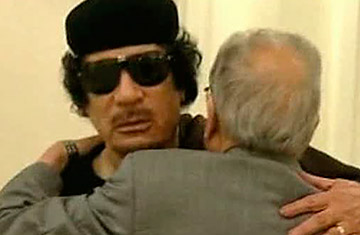
Muammar Gaddafi greets an official in a Tripoli hotel in this still image from a video by Libyan TV released May 11, 2011.
Truth, as they say, is the first casualty of war. Yet even by those measures, the three-month Libyan conflict has brought a wealth of rumors.
Just five days after the revolt erupted in Benghazi, British Foreign Secretary William Hague told reporters that Gaddafi was headed to Venezuela. His remarks sparked a media frenzy, with journalists converging on Caracas to await Gaddafi's arrival in exile. Three days later, on Feb. 24, commodities traders said that oil and gold prices had dropped due to rumors that Gaddafi had been injured. Oil prices dropped again on March 7, after rumors that Gaddafi was scrambling to negotiate an exile deal for himself. And on March 21, days after Western fighter jets began bombing Tripoli, a German newspaper reported that a rocket attack had killed Gaddafi's son Khamis, whose military brigade has led the assault against Libyan rebels. So far, none of the rumors have proved true.
The latest tale surfaced last Friday, when Italy's Foreign Minister Franco Frattini told an Italian reporter that Muammar Gaddafi had fled Tripoli after being wounded in a NATO air strike on his compound the day before. Frattini said he heard the information from Tripoli's Catholic Bishop Giovanni Martinelli, a Libyan-born Italian with close sources across the capital, thanks to his decades in the country. The Bishop, said Frattini, had said that "international pressure has apparently provoked a decision by Gaddafi to seek refuge in a safer place."
The rumor lit up Twitter feeds and led to a few celebrations — premature ones. Within hours, Gaddafi went on state-run Libyan Television to tell his supporters that he was still alive, and to vow to survive the NATO campaign. "I live where you cannot reach and cannot kill me — in the hearts of millions of people," Gaddafi said in a defiant challenge to the coalition. Bishop Martinelli denied the story Frattini attributed to him, telling a French radio station on Saturday that "I've never said he [Gaddafi] was injured or had left Tripoli."
The speech included no video. An unnamed regime official told the Guardian newspaper on Saturday that Gaddafi was worried that video footage could help NATO bombers to pinpoint his exact whereabouts. Gaddafi's statement on Friday was a stark contrast to his wartime television appearances, where he has summoned television crews to film him giving thundering diatribes against the rebels and Western governments. And unlike those hours-long speeches, he spoke for just 90 seconds, igniting speculation among rebel and exile groups that Gaddafi had indeed gone to ground.
Wounded or not, Gaddafi may soon have a legal reason to be out of sight. On Saturday, the International Criminal Court's prosecutor Luis Moreno Ocampo told a Spanish newspaper that he would seek arrest warrants for Gaddafi, his son Saif al-Islam, and his intelligence chief Abdullah Senoussi, when he goes before a judges' panel in The Hague on Monday. If the warrants are issued, the three men would face extradition orders to stand trial in Holland, for having ordered security forces to open fire on unarmed demonstrators in Benghazi in mid-February. U.N. investigators claim that between 400 and 600 Libyans were killed in the first days of the revolt, before the rebels took up weapons, transforming the protest movement into a civil war.
Bringing Gaddafi and company to justice is going to be a tall order. But a warrant and NATO bombs are enough reasons for anyone to go into hiding.
